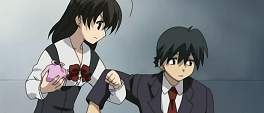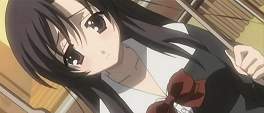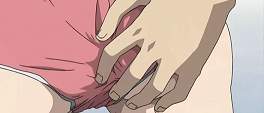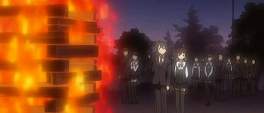I'm sure like many others I was enthralled by the story that the final episode of School Days had been indefinitely postponed due to a supposedly violent ending and its likeness to a real-world killing. Not one to pass up on controversy, I queued up the series expecting it to be a fluffy, real-world version of Shuffle! or perhaps akin to Kimi ga Nozomu Eien; what I didn't expect was an unflinching, overly-dramatic portrayal of the depths of teenage decrepitude.
The first episode of this petite twelve episode series is as mediocre and clichéd as I expected: introverted loner Makoto takes a liking to a girl he sees on the train, female best friend tries to help him get together with her while secretly having the warm-and-fuzzies for him herself. Rolling my eyes and switching off my sensibilities I began to place bets on the most promising axe-wielding female: perhaps the fun-size, silent one is actually a dark-horse in all of this. It took less than half the series to convince me that ending with violence is just one of the punches that School Days will deliver.
I hesitate to call the series "good" or "realistic" as neither is accurate; it holds the same kind of quality as a slow-motion trainwreck and is genuine insofar that very few of the characters remain clichés. Characters and events spiral quickly and unerringly towards disaster as the male protagonist engages in self-destruction on a massive scale. Continually blasé about his partners' emotions he flits from skirt to skirt, discarding women as quickly as they present themselves. His fall from grace is mirrored by the overbearing malevolence of school life and the passive-aggressive bullying enacted on one of the female leads.
In context, the finale is nothing short of inevitable and is as brutal and unwavering as the rest of the series. Makoto has debased or deflowered no less than five women, his self-flagellation culminating in an otherwise commendable foursome; the series' H-game roots are only evident in the amount of sexual deviance present, always implied and never explicit. Neither gender escapes from the series cleanly: catty bullying turns to voyeuristic blackmail, harmless flirting turns to a he-says she-says series of faux-pas; School Days accurately conveys the oppression and down-right vindictiveness of high-school students. Makoto represents everything a male wanted to be in school: promiscuous and uncaring, while also being everything that is despised: cowardly, spiteful and emotionally turbulent.
It's for these reasons that I find it hard to recommend School Days, it is as powerful as it is unrealistic and dredges up far too many rasping memories for it to be comfortable viewing; but it's for that purpose that it's hard to fault it beyond the obvious. The animation is unceasingly average and the audio fitting and unobtrusive; most faults levelled at the story or characters will be at its laughable application of the Tenchi Syndrome or the shallow tertiary characters, beyond that it becomes an opinion on how best to lambaste Makoto. He is a disgusting and detestable character, sometimes feeling his inevitable death is deserved, his saving grace never quite comes and he is murdered for his continuing inability to stop thinking with his genitals.
School Days is by no means required viewing unless you're out to see the quintessential yanderekko, it is as harsh and thought-provoking as you let it be and could easily be disregarded as overblown, melodramatic tripe; the real quality comes from empathising with the characters and being able to see yourself in one of them and asking whether, truthfully, you would do the same...











